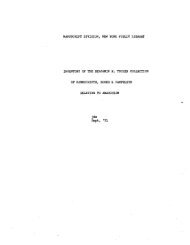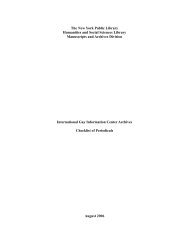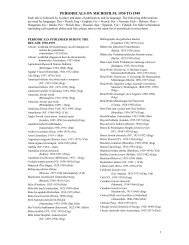pdf available - Multiple Choices
pdf available - Multiple Choices
pdf available - Multiple Choices
Create successful ePaper yourself
Turn your PDF publications into a flip-book with our unique Google optimized e-Paper software.
332 LUBOML<br />
control of the German commandant. For every<br />
minor favor extended to the Jews, these people<br />
demanded payment in gold. Knowing full well<br />
what was awaiting the Jews of Luboml, they kept<br />
quiet so they could squeeze from the Jews everything<br />
they owned. And at a later date they<br />
looked on with joy and actively participated in<br />
the great Jewish Holocaust.<br />
A Judenrat was formed and a force of 10 to<br />
20 Jewish policemen was approved. They all<br />
wore special armbands.<br />
The first decree required all Jews to wear a<br />
Star of David sewn on a white armband. The Jews<br />
were ordered to report every day for forced labor<br />
or face a death penalty. Utensils made of copper<br />
and silver had to be turned in at a prearranged<br />
location. Every day, a few hundred Jews<br />
went to work in various places, including the train<br />
station, a sawmill, etc. From the first day of forced<br />
labor, the Jews were severely beaten by German<br />
and Ukrainian overseers.<br />
The marketplace for Jewish labor took place<br />
every day, beginning at 6 a.m., near the Judenrat<br />
office. All Jews called to work had to appear at<br />
the marketplace. Later came the Ukrainian customers<br />
with slips, and a Jewish policeman led<br />
the Jews away to the assigned workplace. At the<br />
end of the workday, he brought them back.<br />
The Judenrat was assigned one bakery exclusively<br />
for baking bread for the Jews. Every working<br />
individual was apportioned 7 ounces of bread<br />
and a child or a nonworking person 3.5 ounces<br />
of bread per day. The bread was bad, but no one<br />
dared decline it. Outside the stores where bread<br />
was distributed, hundreds of inhabitants, men<br />
and women, waited in long lines to receive their<br />
allotted portion.<br />
Together with all decrees came an order requiring<br />
all peasants to sell their foodstuffs to the<br />
cooperative and forbidding the sale of any merchandise<br />
to Jews.<br />
The decree brought about an instant, general<br />
state of anxiety. Everybody began to worry<br />
about ways of procuring food reserves. Peasants<br />
brought products but bartered them for shoes,<br />
clothing and other items. The prices of goods<br />
were continuously climbing, and people who<br />
had nothing to barter could not receive anything<br />
from the peasants. They had to be satisfied with<br />
the measly ration of bread.<br />
Tuesday, July 1, the town commandant issued<br />
a decree ordering all men to appear the following<br />
morning in the town square with a pail<br />
and broom and be ready to sweep the streets. A<br />
considerable number of people came out.<br />
Then the town commandant appeared, in the<br />
company of gendarmes and police. Five young<br />
men were selected from among those gathered.<br />
They were: Meyer Tseylingold, Shmuel<br />
Vayngarten, Moyshe Zilberman, Jacob Gelibter,<br />
and Shmuel Shuster. The commandant stated<br />
that the day before, on the road between Luboml<br />
and Borki, the telephone lines had been cut. Furthermore,<br />
he said, it is certain that Jews had carried<br />
out this act of sabotage. The five Jews were<br />
therefore sentenced to death.<br />
The men were taken directly to the hill near<br />
the area where the Jewish men were assembled.<br />
A few minutes later, we heard gunfire. Jews were<br />
sent to remove the remains and take them to the<br />
Jewish cemetery.<br />
The following morning, 50 young men, including<br />
myself, were taken to work repairing the<br />
road leading from town to Masheve. The road<br />
near Marmorkow was very sandy and the German<br />
trucks could not go through it. Twenty-five<br />
Jews brought used bricks in carts from buildings,<br />
and 25 other men laid the bricks into the sand.<br />
At 11 a.m., we were given 15 minutes to eat and<br />
they distributed black ersatz coffee.<br />
We had not started to eat when an SS man<br />
exclaimed: "Why are the filthy Jews stuffing<br />
themselves?" Chayim-Wolf, Aliesker's son, went<br />
over to the SS man and explained that we had<br />
been working since 7 a.m. and a German supervisor<br />
had given us a 15-minute break. The SS<br />
man pulled out a rubber stick and began hitting<br />
the Jew over the head until the poor man fell to<br />
the ground in a pool of blood. The same German<br />
beat up three other Jews.<br />
One day, a rumor spread through town, in<br />
the name of someone in the Judenrat. It was said<br />
that anybody who worked at a steady job would<br />
receive an identification card from the labor office<br />
and would not be harmed. However, nonworking<br />
individuals or those who could not find







